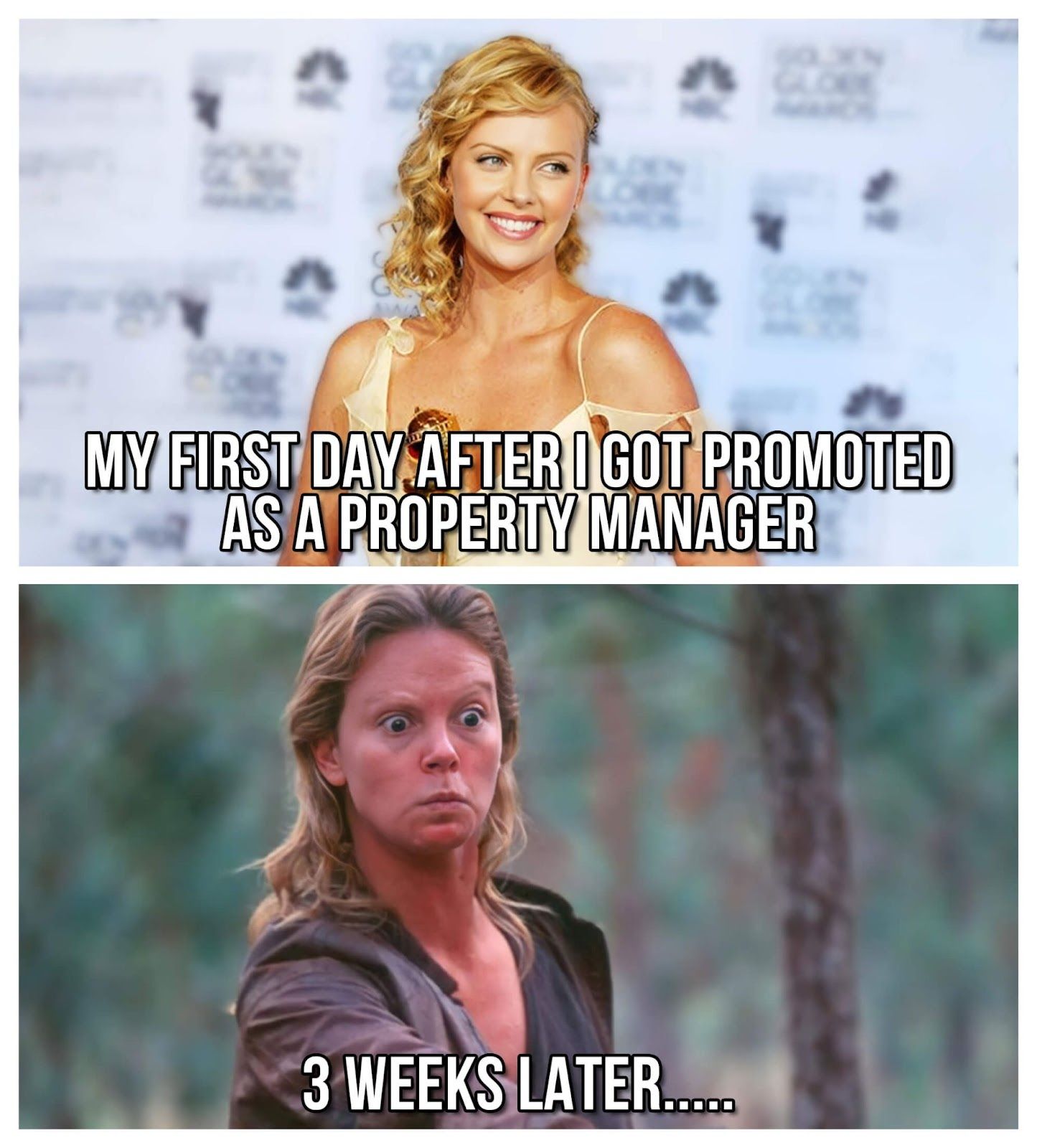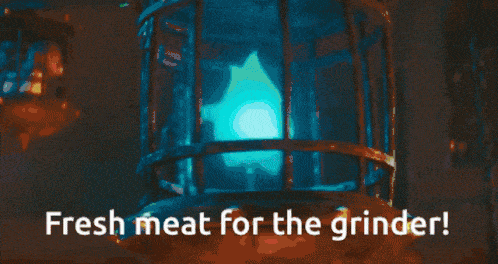PM employees have 70% Churn- Let’s Stop The Meatgrinder
The Dirty Little Secret Behind PMs' Burnout (And How an AI Teammate Fixes It)
🎧 Listen to the Audio Version
There’s a dirty little secret in property management that we have all subconsciously accepted.. It’s the meat grinder.
You’ve seen the meme: “Before Property Management” (A photo of like Charlise, Theone looking glamorous) vs. “Three Weeks In” ( a photo of a strung out person in the woods looking like she just spent two years on a sleep-deprivation diet. )

We laugh. We share. Deep down, we know it isn’t a joke, it’s a job description we accidentally normalized.
The welcome kit is a laptop, a login, and a one-way ticket to Burnout City.
Churn is assumed, stress is the default. It's that constant, humming anxiety in the back of your head, the Sunday Scaries that start creeping in around 3 PM and ruin the rest of your weekend.
Let’s be honest. Too many roles in property management aren’t just tough, they’re designed to be unlivable. That’s the kind of meat grinder problem we’ve come to accept.

And we know, it’s not about bad people or bad intentions; it’s about roles that are structurally unmanageable. Fifteen to nineteen touchpoints just to close a single maintenance ticket.
Inbox tennis with vendors. Scheduling gymnastics with residents. Constant apologies to owners who only hear from you when something goes wrong.
It’s an invisibility trap…all the good work your team does is buried under the firefight, so the only thing visible is bad news.
And here’s the thing: if this is what “the job” looks like, we’ve already set people up to fail. No amount of hustle changes the math.
So let’s stop debating whether AI replaces people. That’s the wrong conversation.
The real question is: How do we redesign the job so it’s actually worth doing? How do we make space for humans to spend their time on the things that matter (judgment calls, proactive planning, and building trust with owners) while taking the repetitive, draining tasks off their plate?
It’s time to change the conversation entirely. Make the hard easy, so the meaningful can happen more often.
The only way to win is to stop thinking of AI as a tool or software to replace people and start seeing it as a teammate or as the best assistant you’ll ever onboard.
AI Won’t Save You Until You Treat It Like a New Hire
Most people approach AI with a simple goal: "How can this tool make my broken process a little faster?" But that’s aiming too low. The real goal isn't a better tool; it’s a better job. The mission is to shift from finding a faster way to manage the meat grinder to eliminating the grinder altogether.
A fundamentally different goal requires a fundamentally different process.
When your goal is to add a tool, you "install" it. But when your goal is a better role for yourself, you hire.
This is a process we all instinctively understand. You wouldn’t just give a new superstar employee a login and expect them to know your business; you’d manage them, coach them, and teach them your playbook. You invest time upfront to build a partner who can eventually operate on their own.
This is exactly how we must approach Agentic AI. To truly redeem the role, we have to stop thinking like software users and start acting like managers while giving AI a career path.
In roughly 90 days, it should grow the way a great teammate does: intern → teammate → operator. Your job is to be its first manager, then its supervisor, then the strategist it supports. Here’s what that journey looks like in practice.
From Intern to Partner in 90 Days
Just like a human teammate, your AI has a career path…a growth curve that happens in phases. And if you manage it right, by Day 90, you don’t just have a tool running in the background… you have a trusted teammate who knows your playbook and frees you from the grind.
Before diving into the how-to, it's important to understand where this is coming from. After a lot of iteration with our top clients, this is what we’ve learned at Vendoroo about how to structure an AI-first onboarding.
We expect that as AI-first companies mature, this kind of hands-on, phased approach will become the standard for success.
These aren’t opinions, they’re patterns from our top-performing clients. When we talked about What Winning With AI Looks Like for PM, we defined success as 85% automation of the maintenance lifecycle. Our top partners who fully embrace this onboarding mindset blow past that, hitting 95% automation or more.
If that’s what “winning” looks like, here’s how you get there:
Month 1: The Intern / Trainee (Shadow Everything, Teach the Gray Areas)
In the first 30 days, your AI teammate is like a bright new intern, and your role is its dedicated manager. This is the most hands-on period, where you meticulously observe its every move. You’ll teach it the basics: how to triage issues, your preferred vendors for specific jobs, and your company’s unique voice. Through constant direction and feedback, you’re coaching it on your creative solutions and backup plans, the invaluable experience that lives in your head.
The goal is to build a solid foundation of trust and understanding.
- What your AI is learning: how to apply the knowledge it already comes embedded with, the way you like it done.
What you’re doing as manager:
- Keeping two tabs open (PMS + Vendoroo) and reviewing every single work order for 14 days.
- Using in-platform notes to ask “why” and give immediate feedback on triage, tone, and vendor selection.
- Correcting mistakes on the spot and explaining the reasoning so it sticks.
- Encoding gray-area plays (e.g., add your trusted handyman to the emergency HVAC list).
- Auditing vendors: categorize skills, mark emergency availability, and prune dead weight.
When the AI doesn’t isn’t sure it can make the perfect call, it will bring it to your attention. That’s exactly what you’d want a new hire to do. The difference here is that questions and mistakes don’t get repeated.
So it compounds quickly to become a Junior Teammate.
Month 2: The Junior Teammate (Let It Run; You Spot-Check)
Now, your intern gets promoted to a role. It’s learned the basics and is ready to take on more responsibility, shifting your role from manager to supervisor.
You no longer need to watch every single task; instead, you spot-check its work and manage the exceptions. It begins to handle routine issues from start to finish with more autonomy.
- What your AI is learning: How to handle common workflows end-to-end; the difference between routine issues and exceptions that need escalation; how to apply judgment.
What you’re doing as a supervisor:
- Shifting from ‘review all’ to daily spot-checks of a sample set.
- Letting correctable mistakes happen and using them as one-time coaching moments.
- Managing exceptions only (safety, high-ticket, truly weird cases).
- Watching for the “Aha!” where it makes the right non-obvious call on its own.
This is when you'll experience that "Aha!" moment, when you see it correctly diagnose a complex issue on its own and save you hours of headaches. Maybe it correctly diagnoses a leak as an HVAC issue instead of a roofing failure- saving time and money.
That’s when you realize, it’s not just executing tasks, it’s making smart calls you can trust.
Month 3: The Operator (Strategy > Firefighting)
By day 90, your AI should be operating the meatgrinder for you. It should operate autonomously on all standard maintenance, freeing you from the daily reactive firefight.
With your newfound time and mental space, you can focus on proactive, high-value work: analyzing vendor performance, developing preventative maintenance programs for owners, and strengthening client relationships. Your new AI teammate is no longer just an assistant; it's a strategic partner that enables you to build your business.
- What your AI is learning: How to run all standard maintenance processes autonomously; how to surface insights from patterns; how to keep you in the loop only for things requiring human judgment.
- What you’re doing as a strategist: Reviewing performance dashboards to anticipate issues; designing preventative maintenance programs as new value-add offerings; bringing owners proactive insights on asset protection and ROI, and seasonal issues before they spike.
And with that 90-day journey, the role itself should cover itself as you grow..
Fixing the Meat Grinder Problem, for GOOD.
By now, you’ve seen how the first 90 days with an AI teammate unfold → intern, junior teammate, operator. And by now the pattern is clear: when you onboard AI like a teammate, the role changes. But here’s the bigger question: why does this matter?
Because this isn’t just about shaving hours off a maintenance log.
It’s about fixing the meat grinder problem for GOOD. It’s about designing work people can succeed at.
And it isn’t just a PM idea; it mirrors America’s AI-first rebuild of manufacturing - a new class of jobs we wrote about in our previous newsletter, A Call To PMs: “Join the National Mission” Roles where technology doesn't replace human skill but elevates it. And ordinary teams do extraordinary work when AI makes the hard easy and humans do the meaningful.
This is how we fix the meat grinder problem, for good. There’s a future generation of property managers who won't even understand the meme.
They’ll look back and say, “Wait, people used to have to do all that scheduling and follow-up manually? That’s insane.”
It’s important to realize this isn’t a blind leap, it’s a climb. When you onboard AI like a teammate and take it in small steps- two weeks of shadowing, thirty days of coaching, thirty more of refinement, and watch the signals that you’re winning- you also de-risk the path out of the grinder and into meaningful work.
At Vendoroo, we believe in sharing these insights because without this understanding, only early adopters and visionaries- those who are driven by wholesale change and undefined challenges- are the ones winning with AI.
But we want to make it easier for the pragmatists- those who seek incremental change and measurable steps- to get it.
Because the technology is ready for them, too. And there is still a window of opportunity where this is a competitive edge as the early majority.
If that sounds like you, we’d love to invite you to audit one of our onboarding cohorts so you can see how it works.
Seeing is believing. Just shoot me an email to pablo@vendoroo.ai, and I’ll get you an invite.
—
Pablo Gonzalez,
Chief Evangelist at Vendoroo

.svg)

.svg)

.svg)
.svg)




